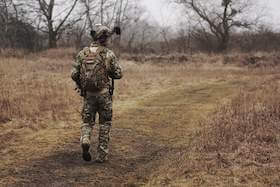CANNABIDIOL (CBD) FOR ATHLETIC PERFORMANCE
Jared D. Hoffman, PhD
Athletes, both professional and recreational, are always looking to gain an edge and push their performance in their respective sport to new levels. Often times, athletes will go to great lengths to do this and will leave no stone unturned. They look for gains in performance by altering their diet, taking supplements, getting more sleep, performing extra recovery methods, and by improving their training regimen. One therapeutic that has been gaining substantial attention in both the scientific community and lay audience is cannabidiol (CBD). CBD is a cannabinoid found in the cannabis plant that has purported health benefits such as reducing inflammation and pain and has even been shown to be effective in certain disease states such as epilepsy. Athletes have now been turning to CBD to see if it can improve their performance. Unfortunately, there is little direct evidence in the scientific literature using CBD for athletic performance. However, CBD does have indirect effects that could potentially improve one’s performance including improvements in sleep and decreases in anxiety and inflammation. These benefits may be due to the actions of CBD on the endocannabinoid system.
The Endocannabinoid System
CBD appears to work through its actions on the endocannabinoid system. This system helps regulate pain, memory, mood, the immune system, and may even be responsible for the runner’s high and exercise-induced euphoria that athletes enjoy. This system is made up of cannabinoids, such as CBD and anandamide, that bind to and modulate the activation of cannabinoid receptors. These receptors are found in the brain and many other organs in the body.1 CBD was initially thought to act directly on these cannabinoid receptors but now it appears its effects may be primarily through the upregulation of other cannabinoids, which act on the cannabinoid receptors themselves.2 However, there is still much to be learned about this system and the mechanisms of action of CBD.
CBD for Anxiety
Anxiety is an emotion that is bound to occur in athletes, but excessive anxiety can impair performance. It is quite common for athletes to become anxious before or during an event or even before an intense training session. Anxiety can cause nervous behaviors and increase muscle tension, restlessness, and fatigue. A certain amount of anxiety could actually improve performance but too much can drastically decrease it. An example of this is choking in tennis, which is when the athlete’s performance plummets as he/she tries to closeout a match. This is often times in part due to a change in mindset as the end of the match draws near and an increase in anxiety. Interestingly, CBD has been demonstrated to help decrease anxiety. In one study, healthy human participants were given CBD and saw significant improvements in their anxiety and overall, it was well-tolerated.3 Another study by Crippa et al. looked at CBD and anxiety in a public speaking event in healthy subjects. In this study, CBD was able to decrease acute anxiety before the event.4 Translating this to athletes, taking CBD could potentially decrease anxiety before competition.
CBD for Pain Management and Inflammation
As athletes goes through an intense training regimen, they inevitably have aches and pains in their joints and delayed-onset muscle soreness (DOMS). Although DOMS may not always lead to decreases in performance, joint pain certainly can. This and general fatigue may also lead to injury, any athlete’s worst nightmare. However, CBD has been demonstrated to decrease markers of inflammation in preclinical studies.5 Although the research is nonexistent in this area, CBD is being used as a topical lotion, which may be the more effective method of application for those suffering from joint pain. Since there is so little research here, it may be up to the athlete to anecdotally try out CBD and see what they think. Nonetheless, the ability to decrease pain and improve recovery could certainly help athletic performance over the long term.
CBD for Sleep
Many athletes struggle to get enough sleep. In professional athletes, this may be due to a rough travel schedule or an intensive training regimen. In recreational athletes, trying to balance the demands of a 40+ plus hour work week with athletic goals can cut into optimal sleep. In turn, this decrease in sleep duration and quality can cause athletic performance to suffer. However, sleep is quite possibly the most important aspect of our health so finding ways to improve it is extremely important. Interestingly, many report CBD to have a sedating effect and CBD has even been used in a human study examining sleep. In this study, the participants sleep improved during the first month of CBD usage. However, the next two months of the study found more varied results.3 Promising evidence has also been found in preclinical studies in this regard. One study found that sleep duration was increased when injecting mice with CBD.6 Notably, the amount of CBD that is taken and one’ genetics may impact its effectiveness on sleep, but more research needs to be conducted. Further, improvements may also conceivably be seen in sleep when anxiety is decreased.
Athletes will immediately tell you that they will do whatever it takes to improve their performance. CBD is a supplement that may help decrease anxiety and inflammation and improve one’s sleep via its actions on the endocannabinoid system. Collectively, these potential improvements may even help improve recovery, which could lead to more gains in athletic performance over time, something every athlete looks for. Although the actual research of CBD usage in athletic performance is extremely limited, it may be worth a try especially with many sports organizations, such as the World Anti-Doping Agency (WADA), no longer prohibiting the use of CBD.
Please discuss with your doctor first for recommendations if you are considering taking CBD for athletic performance. For elite and competitive athletes, also check with the rules and regulations of your sport to ensure CBD is allowed.
References
1. Chye Y, Christensen E, Solowij S. The Endocannabinoid System and Cannabidiol’s Promise for the Treatment of Substance Use Disorder. Front Psychiatry. 2019;10:63.
2. Blessing EM, Steenkamp MM, Manzanares J. Cannabidiol as a Potential Treatment for Anxiety Disorders. Neurotherapeutics. 2015;12(4):825-836.
3. Shannon S, Lewis N, Lee H, et al. Cannabidiol in Anxiety and Sleep: A Large Case Series. Perm J. 2019;23:18-041.
Crippa JA, Zuardi AW, Garrido GE, et al. Effects of cannabidiol (CBD) on regional cerebral blood flow. Neuropsychopharmacology. 2004; 29:417–426.
4. Burstein S. Cannabidiol (CBD) and its analogs: a review of their effects on inflammation. Bioorg Med Chem. 2015;23(7):1377-85.
5. Chagas MH, Crippa JA, Zuardi AW. Effects of acut systemic administration of cannabidiol on sleep-wake cycle in rats. J Psychopharmacol. 2013;27(3):312-6.
ALSO IN RESOURCES
HOW TO DOSE CANNABIDIOL (CBD)
HOW TO DOSE CANNABIDIOL (CBD) Jared Hoffman, PHD Cannobidiol (CBD), a cannabinoid found in cannabis, is currently a hot topic among the general public and in the scientific community with new studies utilizing CBD in a variety of different disease states.1 Due to this...
CANNABIDIOL (CBD) FOR PTSD
CANNABIDIOL (CBD) FOR POST-TRAUMATIC STRESS DISORDERJared D. Hoffman, PhD Cannabidiol (CBD) is a non-psychotomimetic cannabinoid found in the Cannabis plant. CBD, along with tetrahydrocannabinol (THC), the well-known psychoactive component of Cannabis, are just two of...
CANNABIDIOL (CBD) FOR SLEEP
CANNABIDIOL (CBD) FOR SLEEPJared D. Hoffman, PhD The ability to fall and stay asleep in this modern age has become more and more difficult. This is in part due to our hectic lifestyles and being blasted with blue light and sources of entertainment from our phones,...
838 E High St, Suite 268, Lexington Ky 40502
© 2019 On Duty CBD.
This product is not for use by or sale to persons under the age of 18. This product should be used only as directed on the label. It should not be used if you are pregnant or nursing. Consult with a physician before use if you have a serious medical condition or use prescription medications. A doctor’s advice should be sought before using this and any supplemental dietary product. All trademarks and copyrights are property of their respective owners and are not affiliated with nor do they endorse this product. These statements have not been evaluated by the FDA. This product is not intended to diagnose, treat, cure or prevent any disease. By using this site, you agree to follow the Privacy Policy and all Terms & Conditions printed on this site. Void Where Prohibited by Law.




